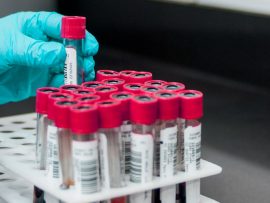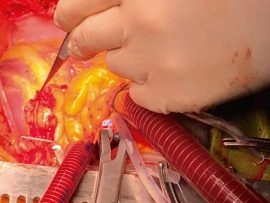Abstract Protamine is widely used after catheter ablation to achieve hemostasis. Anaphylaxis to protamine is a rare but severe complication. A 49-year-old male patient underwent catheter ablation of symptomatic long-standing..
Read MoreAbstract Background: In cardiac surgery, protamine is used to reverse the effects of heparin after separation from cardiopulmonary bypass (CPB). Excess of protamine has been demonstrated to cause platelet dysfunction and..
Read MoreAbstract Objectives The detection of low-range heparin activity is important to correctly assess heparin reversal and rebound, especially after cardiopulmonary bypass. Current parameters are either not available at point-of-care (anti-Xa..
Read MoreAbstract Objectives To retrospectively assess the incidence and severity of perioperative protamine reactions in adult patients with documented history of fish allergy. Design Retrospective observational study. Setting Large academic tertiary..
Read MoreAbstract Protamine sulfate is a standard agent used to reverse heparin anticoagulation during cardiovascular procedures such as coronary artery bypass grafting (CABG). Although rare, it can be associated with severe..
Read MoreAbstract Background Drug shortages are a frequent challenge in current clinical practice. Certain drugs (e.g., protamine) lack alternatives, and inadequate supplies can limit access to services. Conventional protamine dosing uses..
Read MoreAbstract Objective Systemic heparinization during cardiopulmonary bypass (CPB) can significantly affect thromboelastography (TEG). This study investigated the feasibility of adding protamine in vitro to allow assessment of coagulation status using the..
Read MoreAbstract Background Heparin is used for anticoagulation during cardiopulmonary bypass. After weaning from bypass, protamine is administered to neutralize the effects of heparin and thus reestablish hemostasis. Rotational thrombelastometry has..
Read MoreAbstract Background: The conventional method of heparin and protamine management during cardiopulmonary bypass (CPB) is based on total body weight which fails to account for the heterogeneous response to heparin in each patient...
Read MoreAbstract Background Bleeding after cardiac surgery is common and continues to require 10–20% of the national blood supply. Transfusion of allogeneic blood is associated with increased morbidity and mortality. Excessive..
Read MoreAbstract Introduction Individualized heparin and protamine management is increasingly used as a strategy to reduce coagulation activation and bleeding complications. While it is associated with increased heparin requirements during Cardiopulmonary..
Read MoreAbstract Protamine, a highly basic protein isolated from salmon sperm, is the only clinically available agent to reverse the anticoagulation of unfractionated heparin. Following intravenous administration, protamine binds to heparin..
Read MoreAbstract Background: Systemic anticoagulation with heparin during cardiopulmonary bypass (CPB) should be neutralized by protamine administration to restore normal hemostasis. Our previous study showed the protamine-to-heparin ratio (P-to-H) of 1:1..
Read MoreAbstract Objective To retrospectively evaluate a conservation approach to heparin reversal implemented during times of critical shortages. This approach was aimed at maintaining access to cardiac surgical services. Setting In-patient hospital..
Read MoreAbstract Background A multidisciplinary Quality Assurance/Performance Improvement study to identify the incidence of “heparin rebound” in our adult cardiac surgical population instead detected a thromboelastometry pattern suggestive of initial protamine..
Read MoreAbstract Acute bioprosthetic valve thrombosis (BPVT) is considered a rare complication and has seldom been described. Moreover, acute intraoperative BPVT is exceedingly rare, and its management remains a major clinical..
Read MoreAbstract Background: Postoperative atrial fibrillation (POAF) is defined as new-onset AF in the immediate postoperative period. The relatively high incidence of POAF after cardiac surgery is well described, but pathophysiological..
Read MoreAbstract Background: Protamine administration post-cardiopulmonary bypass (CPB) can potentially cause hemodynamic instability. Histamine released from mast cells is believed to be responsible for hypotension after protamine administration. The aim of this..
Read MoreAbstract Changes in hemodynamics and coagulation hemostasis during the use of protamine sulfate to neutralize heparin in a ratio of 0.5:1 in coronary artery bypass graft surgery have been studied...
Read MoreAbstract Introduction Our study aim was to explore how different protamine-heparin ratios impacted enzymatic coagulation and acellular fibrin clot growth in plasma using an in vitro model. We hypothesized that..
Read MoreAbstract In this study, we have evaluated and examined various nursing effects of improved administration of protamine sulfate neutralizing heparin after cardiopulmonary bypass. For this purpose, retrospective analysis was made..
Read MoreAbstract Systemic is necessary before (CPB) in cardiac surgery, and administration to neutralize heparin for is required at the end of CPB. Because protamine is an allogeneic protein extracted from the sperm of specific..
Read MoreAbstract Purpose. Cardiac surgery is characterized by a high risk of complications related to perioperative bleeding. Guidelines suggest the use of local algorithms based on perioperative point-of-care tests to assess and..
Read MoreAbstract We report a case of Kounis syndrome that led to shock after protamine administration during percutaneous coronary intervention (PCI). A man in his 50s was admitted to the nearest..
Read MoreAbstract Perioperative myocardial infarction is a serious complication affecting a significant portion of patients undergoing coronary artery bypass graft surgery. This may arise due to coronary graft thrombosis, a rare..
Read MoreAbstract Protamine is mainly used to reverse the anticoagulant effect of heparin after cardiopulmonary bypass (CPB). Unfortunately, it is associated with adverse clinical reactions ranging from minor cardiopulmonary instability to..
Read MoreAbstract Background One of the challenges during cardiac surgery is to keep patients fully anticoagulated during the time and reversing at the end of surgery. For that purpose, heparin and its approved..
Read MoreAbstract BACKGROUND: The standardized management of anticoagulation during the cardiopulmonary bypass seems inaccurate because of patients and surgeries variability. This study evaluates if an individualized management of heparin and protamine..
Read MoreAbstract Background The dose of protamine required following cardiopulmonary bypass (CPB) is often determined by the dose of heparin required pre-CPB, expressed as a fixed ratio. Dosing based on mathematical..
Read MoreVanderbilt University Medical Center; Department of CV Surgery: Faculty Forum: Understanding alpha stat and pH stat Faculty: Katie Faella CCP, LCP, FPP, J. Hoffman, MD, Matt Warhoover, CCP, A. Lepore,..
Read More














